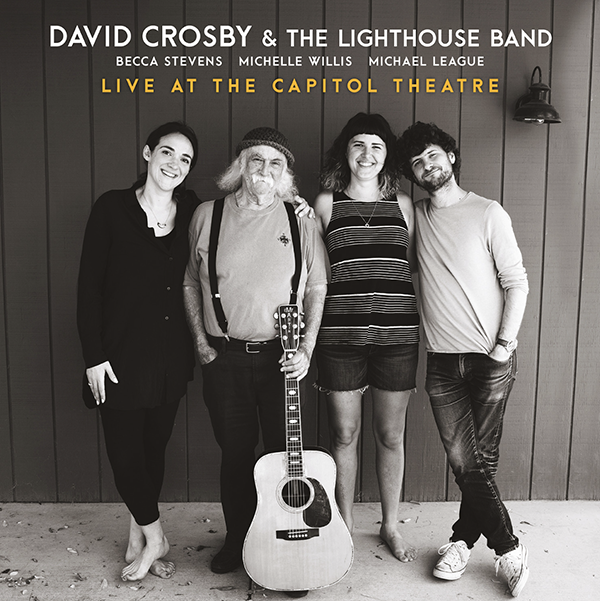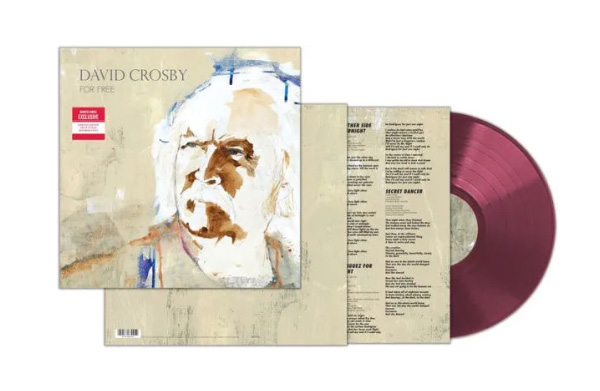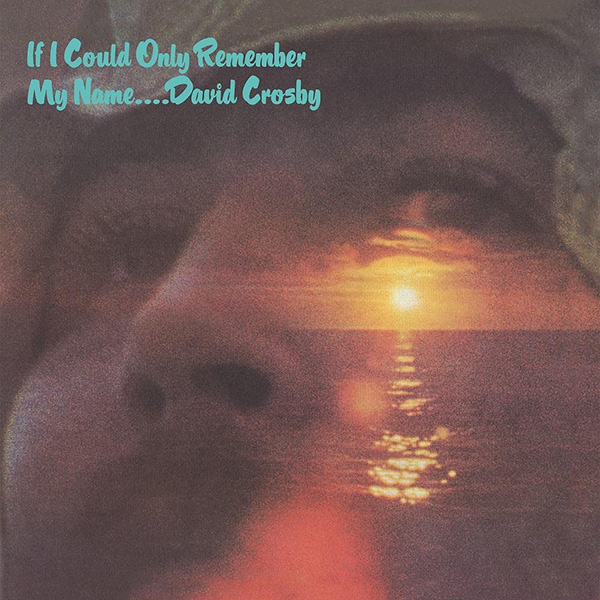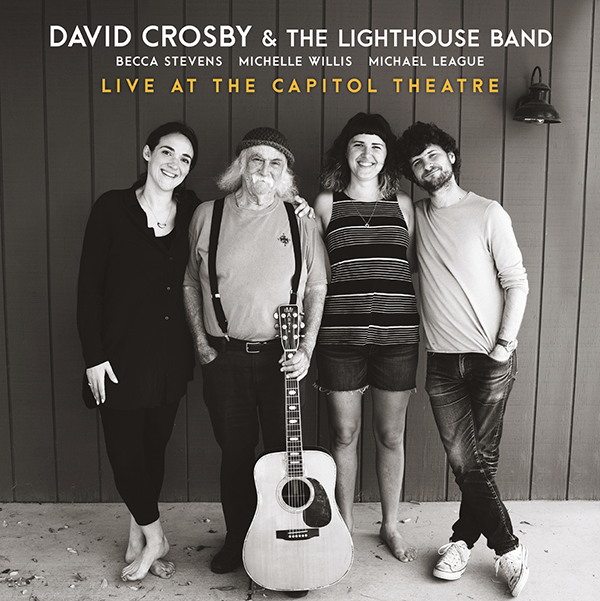Lengthy Time Coming: Above, David Crosby remembers his identify, and his mantle. Photograph by Anna Webber.
David Crosby has the voice of an angel. Not solely are you able to hear his distinctive vocal tone coming throughout pure and true all all through his most up-to-date studio album, For Free — one in all AnalogPlanet’s High New LP Releases of 2022, in truth — however you possibly can hear his long-entrenched intuition for fantastically layered harmonies on David Crosby & The Lighthouse Band’s Dwell on the Capitol Theatre, at the moment out there in a 1CD/1DVD bundle through BMG, however (hopefully) coming quickly on vinyl.
The very fact is, well-arranged and well-performed Dwell tracks like “Issues We Do for Love,” “Laughing,” and “What Are Their Names” will sound even higher on high-grade vinyl, as quickly because the fates-cum-pressing-plants enable. “I completely agree with you,” Crosby confirms. “In the event you like vinyl as a lot as I do, then you recognize the highest quality we will probably ship is the correct factor to ship.”

Crosby provides that the chemistry he feels along with his three Lighthouse Band bandmates — guitarist/vocalist Becca Stevens, keyboardist/vocalist Michelle Willis, and guitarist/bassist/vocalist Michael League — has been fairly palpable. “I do have one other report coming with The Lighthouse Band you haven’t heard but,” he notes, “and I simply don’t have a title for it but. However it’s already mastered, and it’s prepared to come back out.” (Sidenote: As soon as that new Lighthouse Band album makes its approach to vinyl, relaxation assured, I’ll be talking with Croz about it. “We must always do that once more someday,” he supplied — so keep tuned!)
When pressed, Crosby ascribes his lifelong vocal prowess to a sure sort of, er, let’s consider, puffery — and he desires to maintain singing so long as he can. “I do know that my voice continues to be hanging in there — which is essential to me, as a result of my arms are going and I can’t actually play [guitar] very effectively anymore,” he admits. “That I can sing is like my final bastion of musical enter. I actually adore it, so I’m actually glad it’s nonetheless working. It should fail too, sooner or later someplace — but it surely hasn’t but. I’m attempting to squeeze each little bit of music out earlier than I can’t do it. I actually love making music, man. I’m a bit of devastated by not having the ability to play anymore, so I’m actually pushed to sing as a lot as I humanly, probably can.” Carry on holding on, Croz.
Crosby, 81, and I obtained on the cellphone to debate the significance of overtones all all through his recording profession, why having Miles Davis cowl one in all his most heartfelt songs is a profession spotlight, and why his very first solo album — February 1971’s If I May Solely Keep in mind My Identify — stays an audiophile benchmark LP to this very day. I believed I’d seen somebody who appeared eventually / To know the reality. . .

Mike Mettler: Very first thing I’ve to say is how a lot I take pleasure in listening to For Free on vinyl. I particularly needed to have the rum-punch shade vinyl model of it, so I went to Barnes & Noble to purchase it. I think about having For Free on vinyl needs to be one thing that was vitally vital for you.
David Crosby: Yeah, it was. I like vinyl quite a bit. I like what it does to the sound. I at all times have.
Mettler: I even have to present you credit score for the tune you and your son James Raymond co-wrote on For Free with Donald Fagen, “Rodriguez for a Night time,” which I feel is only a stunning piece of labor.
Crosby: Thanks, man! I’m a big, gigantic Donald Fagen fan.
Mettler: Me too. What’s your favourite Donald Fagen and/or Steely Dan observe? Do you’ve one thing of his, or theirs, that’s your go-to?
Crosby: , I’ve been attempting for years to choose one — I can’t! It’s unimaginable. Simply once I resolve “Josie” [from September 1977’s Aja] is it, [the song] “Aja” comes on and I feel, “No, possibly that’s it” — after which impulsively, I’m into [the title track to November 1980’s] Gaucho. I can’t choose. I like all these data and a bunch of different stuff they did, however I actually love these two data. They’re in my High 10 for all times — each of them.
Mettler: Yeah. I’m not gonna argue with that. For me, the title observe to Aja is at all times going to be particular as a result of I like the interaction between [tenor saxophonist] Wayne Shorter and [drummer] Steve Gadd in the midst of it. It’s simply so sensible. Such a tremendous factor.
Crosby: Yeah, yeah. Powerful stuff.
Mettler: Nice powerful stuff, for positive. One factor I feel that’s nonetheless essential to you is the way you perceive the significance of capturing overtones in your recordings. In the event you wouldn’t thoughts increasing on that a bit of bit extra, inform me why overtones proceed to be vital within the mixes and songs you give you, particularly after we take heed to your music on vinyl.
Crosby: Properly, I feel most individuals don’t actually know they’re there. However for those who’re an individual who works in open tunings on a guitar, then there’s a factor that occurs. You may get all six strings so in tune that, till you get it, there are simply the first tones coming off the strings. And once you do hit it, all of a sudden there’s like six additional notes — a complete bunch of additional notes. And a few of them are in locations the strings aren’t. A few of them are at fifths or thirds, in relationship to the strings. It’s simply so startlingly stunning when you will get it to occur.
Overtones, in a chord — you get quite a lot of ’em off a extremely good piano. If you play a chord on a piano, there are extra notes there than you performed. And that’s the overtones working for you.
Mettler: Are you able to give me some examples of your favourite songs that you just’ve written and performed that we will inform the AnalogPlanet viewers, “Go take heed to this tune on vinyl to listen to what David is speaking about right here,” out of your standpoint?
Crosby: Okay. Properly, there’s a purely vocal one known as “Samurai” [originally from August 2004’s Crosby & Nash] that has some fairly fascinating overtones in it, simply generated off of a capella concord vocals.
The tune “Laughing” [from February 1971’s If I Could Only Remember My Name] has guitar overtones in it. If you will get the observe up loud on actually good tools, you possibly can hear ’em. Geez, there’s quite a lot of locations in my stuff with sure tunings, from, say, all the things from “Guinnevere” ahead. When you possibly can pay attention to only the guitar — you’ll hear it. [“Guinnevere” is, of course from May 1969’s seminal Crosby, Stills & Nash.]
Mettler: I’m glad you mentioned that, as a result of “Guinnevere” has at all times been one in all my very own decisions as being additional particular to take heed to on vinyl. As a quick sidebar to that, I actually love the Miles Davis model of that tune.
Crosby: Me too, man! What a thrill it was to listen to the Miles model of “Guinnevere.” I feel it’s one of many essential musical occasions of my life, man — that he recorded that tune.
[MM notes: Miles Davis originally cut “Guinnevere” during the recording sessions for Bitches Brew on January 27, 1970. An 18-minute version of it appears on November 1979’s Circle in the Round, but the full-length 21-minute version appears on November 1998’s The Complete Bitches Brew Sessions box set.]
Mettler: Yeah, it truly is a tremendous model. And also you met Miles at one level, didn’t you?
Crosby: Yeah, and it was a completely gorgeous factor. I’m standing in entrance of The Village Gate jazz membership, within the Village [i.e., in Greenwich Village, in New York City]. I had simply come out of a present in there, and whereas I’m standing there, he walks as much as me, and he says (impacts low-toned Miles Davis vocal rasp), “You Crosby?” And I mentioned, “Sure sir. Sure, I’m.” “I’m Miles.” I mentioned, “I know.” (chuckles) He mentioned, “I reduce one in all your tunes.” And my coronary heart stopped. My brains simply ran out my nostril, in a puddle. I mentioned, “You, wha . . . you wha. . . you what??” And he mentioned, “I reduce one in all your tunes You wanna hear it?” And I mentioned, “Oh, God — sure!” And he mentioned, “Comply with that automobile.” It was a brown Ferrari. He and his girl obtained within the Ferrari, and I adopted them in a cab. We drove as much as his place in Midtown, and he performed it for me. I feel it’s one of many essential musical occasions of my life, man — that he recorded that tune.
Mettler: And if I additionally keep in mind accurately, [July 1960’s] Sketches of Spain is one in all your favourite albums, is that proper?
Crosby: Sure.
Mettler: What’s it about that Miles Davis album that touches you so deeply?
Crosby: His taking part in. I’m disturbed by the truth that the orchestra isn’t precisely in tune, however his taking part in is simply superb.
Mettler: Yeah, even when we’ve all listened to that album 50,000 occasions, I by no means get uninterested in it.
Crosby: Not less than 50,000 occasions — and that’s nearly as many occasions as I’ve listened to Joni [Mitchell’s] Blue, which is my favourite report. [Blue was released in June 1971.]
Mettler: Proper? And once you’re listening to these data on vinyl, I really feel such as you get these additional “really feel” issues that we’ve been speaking about.
Crosby: I don’t know if it’s “additional” — it’s a unique matrix for the sound. Yeah. You get a completely different sound, and I like how the sound organizes itself in a vinyl report, very a lot. I do suppose our digital stuff has gotten to the purpose the place it sounds glorious, however I like what occurs to sounds on a vinyl report, yeah. I at all times have.
Mettler: I do know you have been listening to classical music from composers like Bach in your family as a child rising up in Southern California, however what have been the primary non-classical albums you keep in mind listening to?
Crosby: Moreover Ella [Fitzgerald]? That was my first report. And the subsequent one was one which my mom purchased — effectively, there have been three. There was Josh White, Odetta, and The Weavers.
Mettler: Wow. Proper there, in these three data, I really feel like that’s David Crosby musical DNA 101.
Crosby: (laughs) You’ll be able to inform a lot, proper from these data, man!
Mettler: Yeah, and I feel “Déjà Vu” [the title track to Crosby, Stills, Nash & Young’s landmark March 1970 album] might in truth be what you get when all these issues are put collectively.
Crosby: Properly, these are my influences. And there are different individuals, like keyboard gamers in jazz bands — Invoice Evans, and McCoy Tyner. Individuals like that actually blew my thoughts. Quite a lot of stuff blew my thoughts, man. Shostakovich blew my thoughts, you recognize? (laughs) I feel the broader spectrum of music you take heed to, the higher you pay attention — and the extra you perceive about music. One other report I nonetheless take heed to it quite a bit is Climate Report’s Heavy Climate [released in March 1977]. I actually love that band, man. That was simply possibly my most favourite jazz band.

Mettler: And that’s a terrific LP, too — Heavy Climate. However to get again to your personal catalog, I’ve to notice that If I May Solely Keep in mind My Identify actually is an audiophile basic LP at this level, wouldn’t you agree?
Crosby: Yeah, I feel so, in all probability. It’s a extremely odd expertise for me — that report, man. I used to be in nice ache — and on the similar time, there was nice pleasure there. It’s actually arduous to separate the 2. They usually. . . (slight pause) they battle. (chuckles)
[MM notes: The “pain” Croz is referring to here is him still being in the midst of mourning the death of his then-girlfriend, 21-year-old Christine Hinton, in a car accident in 1969.]
Mettler: Yeah, I completely get that. Though it’s 50-plus years gone from when that album got here out, I really feel like — and I feel we really feel this fashion with quite a lot of music, really — for those who personally put one thing on from that report, it takes you instantly again to the place you have been once you made it, proper?
Crosby: Just about, yeah.
Mettler: You could possibly have not shared any of that, actually, however you felt you had to.
Crosby: I don’t know if I needed to, man — however I didn’t have any a lot of a selection, you recognize? It was gonna come out. It was too massive for me to maintain it in. It was too massive for me to take care of on my own.
It was one of many causes I fell a lot in love with [Jerry] Garcia — he didn’t speak about it, however he knew completely effectively what was occurring, and he saved coming each night time, making music with me — and that saved me alive. [Jerry Garcia is the late, great Grateful Dead guitarist/vocalist who played guitar and pedal steel on much of the Name album, as well as contributing vocals to “What Are Their Names.”]
Mettler: Properly, you guys did it proper. Why do you suppose If I May Solely Keep in mind My Identify is such a good-sounding report? Is it simply the best way you recorded it? It nonetheless holds up amazingly, right this moment.
Crosby: A variety of causes. One, Stephen Barncard is an efficient engineer. Two, [Wally] Heider’s [studio, in San Francisco] at the moment had an excellent sound. And three, we had quite a lot of time. I might take my time and construct vocal stacks that happy me, that have been as much as my specs — and that’s fairly uncommon. I’m very choosy in that manner. It’s arduous to make me glad, acoustically.
And so, it was fairly wonderful. A reasonably wonderful expertise. I I feel quite a lot of it needed to do with the truth that we might take our time — and we did. We had time to take heed to these vocals, and stack ’em. Actually take my time, and stack ’em.
The opposite factor about engaged on that album was, I don’t know what’s gonna occur once I write. I simply attempt to maintain open, and see what’s coming.
Mettler: And isn’t that a part of the thriller of the writing course of? Generally, it doesn’t matter what you or I are writing about, typically I really feel just like the act of considering is simply as vital as doing. You concentrate on the method itself — possibly for hours, even days, after which. . .
>Crosby: (interjects) And typically, not considering. Generally, you’re attempting to maintain your thoughts clean to see what pops in. There are quite a lot of ranges to remember right here, man — and never all of ’em are consciously monitored on a regular basis. A few of ’em are working away at constructing lyrics once you’re doing one thing else — brushing your enamel, or no matter. There’s one other a part of my thoughts, anyway, that’s sitting there going, “Hmm. I’m wondering if this suits into right here. How would this sound?”
Mettler: Is there a great instance of David’s finest “not considering” tune? One thing that simply occurred that you just weren’t desirous about, however you bought it within the second?
Crosby: Mmmm. (takes transient pause) That vocal piece on the finish of If I May Solely Keep in mind My Identify [“I’d Swear There Was Somebody Here”]. It was simply purely, purely invented within the second of standing there on the microphone, and that’s what got here out.
Mettler: Ahhh, yeah, yeah. That’s a phenomenal instance. Properly, I don’t wanna over-eatup your time, so let me throw this ridiculously arduous projection-question at you. Let’s simply say it’s 50 years from now, in 2072. [MM notes: This interview took place in late 2022 and not in early 2023; hence the reference to 2072 here.] Except science has finished one thing magical, you and I are in all probability not bodily on the planet anymore, however in 2072, and nevertheless individuals take heed to music, if someone sorts in “David Crosby” and one thing of yours comes up, what would you like a listener to listen to at the moment sooner or later?
Crosby: Ohhh, it’d be arduous for me to choose, however I suppose If I May Solely Keep in mind My Identify, in all probability.
Mettler: Nice selection. What would you need them to get out of that have? What sort of factor would you like listeners to listen to in regard to any of your music?
Crosby: I would like them to get the thought of musical freedom — that you just take heed to quite a lot of completely different stuff from quite a lot of completely different locations, in quite a lot of alternative ways.


Look in Their Eyes: Above, David Crosby & The Lighthouse Band harmonize onstage. Photograph by Scott Harris.


